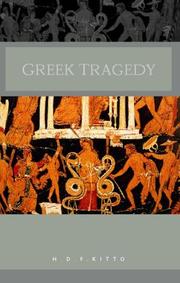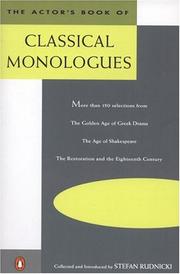| Listing 1 - 10 of 183 | << page >> |
Sort by
|
Book
ISBN: 311156956X 9783111569567 1306297125 9781306297127 Year: 1970 Publisher: Berlin De Gruyter
Abstract | Keywords | Export | Availability | Bookmark
 Loading...
Loading...Choose an application
- Reference Manager
- EndNote
- RefWorks (Direct export to RefWorks)
Book
ISBN: 3110817241 9783110817249 9783110253634 Year: 2011 Publisher: Berlin ; Boston : De Gruyter,
Abstract | Keywords | Export | Availability | Bookmark
 Loading...
Loading...Choose an application
- Reference Manager
- EndNote
- RefWorks (Direct export to RefWorks)
Book
ISBN: 1472521250 1472539788 1472521269 9781472521262 9780715637142 9781472521255 Year: 2008 Publisher: London Bloomsbury
Abstract | Keywords | Export | Availability | Bookmark
 Loading...
Loading...Choose an application
- Reference Manager
- EndNote
- RefWorks (Direct export to RefWorks)
"'Orestes' was one of Euripides' most popular plays in antiquity. Its plot, which centres on Orestes' murder of his mother Clytemnestra and its aftermath, is exciting as well as morally complex; its presentation of madness is unusually intense and disturbing; it deals with politics in a way which has resonances for both ancient and modern democracies; and, it has a brilliantly unexpected and ironic ending. Nevertheless, 'Orestes' is not much read or performed in modern times. Why should this be so? Perhaps it is because 'Orestes' does not conform to modern audiences' expectations of what a 'Greek tragedy' should be. This book makes 'Orestes' accessible to modern readers and performers by explicitly acknowledging the gap between ancient and modern ideas of tragedy. If we are to appreciate what is unusual about the play, we have to think in terms of its impact on its original audience. What did they expect from a tragedy, and what would they have made of 'Orestes'?"--Bloomsbury Publishing "Orestes" was one of Euripides' most popular plays in antiquity. Its plot, which centres on Orestes' murder of his mother Clytemnestra and its aftermath, is exciting as well as morally complex; its presentation of madness is unusually intense and disturbing; it deals with politics in a way which has resonances for both ancient and modern democracies; and, it has a brilliantly unexpected and ironic ending. Nevertheless, "Orestes" is not much read or performed in modern times. Why should this be so? Perhaps it is because "Orestes" does not conform to modern audiences' expectations of what a 'Greek tragedy' should be. This book makes "Orestes" accessible to modern readers and performers by explicitly acknowledging the gap between ancient and modern ideas of tragedy. If we are to appreciate what is unusual about the play, we have to think in terms of its impact on its original audience. What did they expect from a tragedy, and what would they have made of "Orestes"?
Book
ISBN: 1283020580 9786613020581 0199830665 9780199830664 Year: 2011 Publisher: New York : Oxford University Press,
Abstract | Keywords | Export | Availability | Bookmark
 Loading...
Loading...Choose an application
- Reference Manager
- EndNote
- RefWorks (Direct export to RefWorks)
Based on the conviction that only translators who write poetry themselves can properly re-create the celebrated and timeless tragedies of Aeschylus, Sophocles, and Euripides, the Greek Tragedy in New Translations series offers new translations that go beyond the literal meaning of the Greek in order to evoke the poetry of the originals. This volume collects Euipides' Alcestis (translated by William Arrowsmith), a subtle drama about Alcestis and her husband Admetos, which is the oldest surviving work by the dramatist; Medea (Michael Collier and Georgia Machemer), a moving vengeance story and an
Book
ISBN: 1472591550 1472591542 9781472591548 9781472591555 9781472591524 9781472591531 1472591534 1472591526 Year: 2017 Publisher: London
Abstract | Keywords | Export | Availability | Bookmark
 Loading...
Loading...Choose an application
- Reference Manager
- EndNote
- RefWorks (Direct export to RefWorks)

ISBN: 3110862034 9783110862034 3110109220 9783110109221 Year: 1986 Publisher: Berolini Walter de Gruyter
Abstract | Keywords | Export | Availability | Bookmark
 Loading...
Loading...Choose an application
- Reference Manager
- EndNote
- RefWorks (Direct export to RefWorks)
Greek drama (Comedy) --- Poets, Greek. --- Greek poets --- Greek drama
Book
ISBN: 9892602714 9892601572 Year: 2012 Publisher: Coimbra University Press
Abstract | Keywords | Export | Availability | Bookmark
 Loading...
Loading...Choose an application
- Reference Manager
- EndNote
- RefWorks (Direct export to RefWorks)
Multi
ISBN: 110721100X 0511848862 1282749250 9786612749254 0511781237 0511901631 0511902425 0511799276 0511797877 0511900848 9780511902420 9780521705608 0521705606 9780521879743 0521879744 9780511781230 9780511900846 Year: 2013 Publisher: Cambridge Cambridge University Press
Abstract | Keywords | Export | Availability | Bookmark
 Loading...
Loading...Choose an application
- Reference Manager
- EndNote
- RefWorks (Direct export to RefWorks)
This book provides an accessible introduction for students and anyone interested in increasing their enjoyment of Greek tragic plays. Whether readers are studying Greek culture, performing a Greek tragedy, or simply interested in reading a Greek play, this book will help them to understand and enjoy this challenging and rewarding genre. An Introduction to Greek Tragedy provides background information, helps readers appreciate, enjoy and engage with the plays themselves, and gives them an idea of the important questions in current scholarship on tragedy. Ruth Scodel seeks to dispel misleading assumptions about tragedy, stressing how open the plays are to different interpretations and reactions. In addition to general background, the book also includes chapters on specific plays, both the most familiar titles and some lesser-known plays - Persians, Helen and Orestes - in order to convey the variety that the tragedies offer readers.
Greek drama (Tragedy) --- Greek drama. --- Greek literature --- Greek drama --- History and criticism --- Drama --- Classical Greek literature --- Arts and Humanities --- History

ISBN: 1317761456 1317761448 1315800071 9781317761440 9781315800073 0415289645 9780415289641 9781317761457 9781317761433 131776143X 9781138180031 1138180033 Year: 2002 Publisher: London New York
Abstract | Keywords | Export | Availability | Bookmark
 Loading...
Loading...Choose an application
- Reference Manager
- EndNote
- RefWorks (Direct export to RefWorks)
This classic work not only records developments in the form and style of Greek drama, it also analyses the reasons for these changes. It provides illuminating answers to questions that have confronted generations of students, such as:* why did Aeschylus introduce the second actor?* why did Sophocles develop character drawing?* why are some of Euripides' plots so bad and others so good?Greek Tragedy is neither a history nor a handbook, but a penetrating work of criticism which all students of literature will find suggestive and stimulating.

ISBN: 0140106766 Year: 1988 Publisher: New York, N.Y. Penguin Books
Abstract | Keywords | Export | Availability | Bookmark
 Loading...
Loading...Choose an application
- Reference Manager
- EndNote
- RefWorks (Direct export to RefWorks)
Acting --- English drama --- Greek drama --- Monologues --- Auditions
| Listing 1 - 10 of 183 | << page >> |
Sort by
|

 Search
Search Feedback
Feedback About UniCat
About UniCat  Help
Help News
News